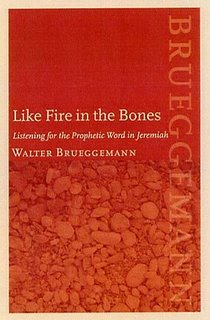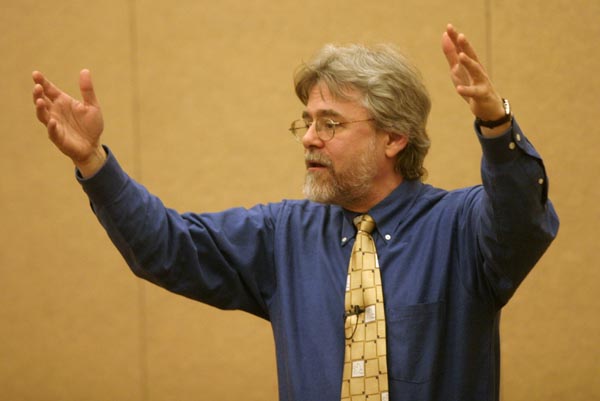Jeremiah, Brueggemann and 9/11

Here are some quotes from Fire in the Bones: Listening for the Prophetic Word in Jeremiah by Walter Brueggemann. I exclaimed about the significance of this new book a few weeks ago in a brief blog post. In keeping with our sober mood today, I thought I’d offer a few of his thoughts, to be read carefully… Brueggemann’s observation—a key to his decades of work---that the Bible calls us to “embrace exile” has been profoundly helpful to me in the very hard times of grief and despair. It is not meant to be glib or unkind, and, for me, is a more honest rumination—in light of the whole Biblical narrative, and the very real horror of 9/11 (and the sadnesses of those many who lost loved ones that day) ---than the more obviously sentimental words of comfort.
***
The longer I have worked on Jeremiah, the more I have been struck by the incredible contemporaneity of those materials. Of course the text stands at a distance from us, and that distance must be taken seriously. But once that distance is acknowledged, much of the text sounds as though it had been written about our time and place. Specifically, I have found it interpretively suggestive to see an analogue between the destruction of Jerusalem in the sixth century around which the book of Jeremiah pivots, and the crisis of 9/11 in U.S. society. …symbolically the significance of the vent is enormous because it represents the undoing of U.S. exceptionalism, the notion that the United States by the providence of God is not subject to the laws of history as is every other nation state. That same sense of exceptionalism operated in ancient Jerusalem, under the aegis of king and temple, to claim that Jerusalem was immune to the vagaries of history. That destruction of Jerusalem made the continuation of that illusion in ancient Israel impossible. Mutatis mutandis, the crisis of 9/11 also constitutes a recognition that U.S. exceptionalism is broken; that is why the disaster is so acute for those who practice the ideology of the United States as a privileged superpower, and why the break is so unnerving for a younger generation that has never had the occasion to questions that unspoken but widely assumed claim. In both ancient Jerusalem and in contemporary U.S. society, life and faith after the loss of exceptionalism constitute a deep challenge that at the same time evokes denial and generates despair and cynical violence. (from the Preface page xxi)
***
Jeremiah’s word borne in Israel concerns the end of the known world, the world presided over by the kings and priests of this age, who imagine themselves secure and stable and safe. Jeremiah must assert that the world, organized against God’s covenantal faithfulness, will and must end, perhaps by the hand of Babylon. Such a terrible ending is always thought to be “too hard” (impossible) for YHWH (32:27). But YHWH can do it; life is forfeited if it tries YHWH too long.
Jeremiah’s word born among Judah’s exiles is about the beginning of a new world wrought only by the mercy and freedom of God. This is a new possibility judged by hopeless former rulers to be impossible. They believe that there can be no new thing. Such a new world with a new David, a new covenant, a new healing, is always thought to be “too hard” for YHWH. But YHWH can do it. Life is given again when YHWH is known to be the giver of newness.
(from a chapter called Jeremiah: Portrait of a Prophet page 17)
***
How do we move from “there is no peace” to announcing “peace” and “good news”? The answer is that peace, which is impossible and not available, becomes possible and available when, and only when, the holy city is dismantled and God is driven back to square one to create a new people and to rebuild a new city. Peace could not be announced to Jerusalem, God would not rule in power, until its idolatrous organization of public life had come to an end. Peace is not possible until there is a dismantling of the holy citadel and an embrace of exile as the place of God’s newness.
(from a chapter called A World Available for Peace page 177)





<< Home